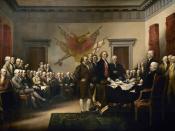After the United States won its goal of independence, Americans soon discovered the intense struggle to develop the area and its people into a united country. These struggling developments, which had overall outcomes of more failures than successes, brought about a sense of doubt and uncertainty in John Adams, a founding father who was actively involved in government. In the quotation "The Union is still to me an Object of as much Anxiety as ever Independence was" implies that although he has retired from his political life, he still has worry for the future existence and prosperity of the United States. The basis for his uncertainty, distress, and doubt may be the political, economic, and militaristic problems that occurred from 1788 to 1825. These events perhaps led Adams to believe that the American existence was actually in danger as a result of its lack of action to excel and compete with the other nations in that time of history.
Partisanship and the development of the political parties contributed to the uncertainty of Adams. All of the political struggles began when George Washington appointed Alexander Hamilton and Thomas Jefferson as two cabinet members. This significant event led to the creation of political parties during the 1790s, as Hamilton and Jefferson found many different views on politics. The split of Hamilton into the Federalist faction and Jefferson into the Republican faction marked the beginning of political division between the states. Partisan newspapers and political clubs did not aid the process of unification. The Gazette of the United States, started by John Fenno in 1789, favored Hamilton's political philosophy. The National Gazette was the official newspaper established in 1790 by Philip Freneau that supported the Republican principles. George Washington also did not help in the unifying progress, as he himself supported the Federalists...


